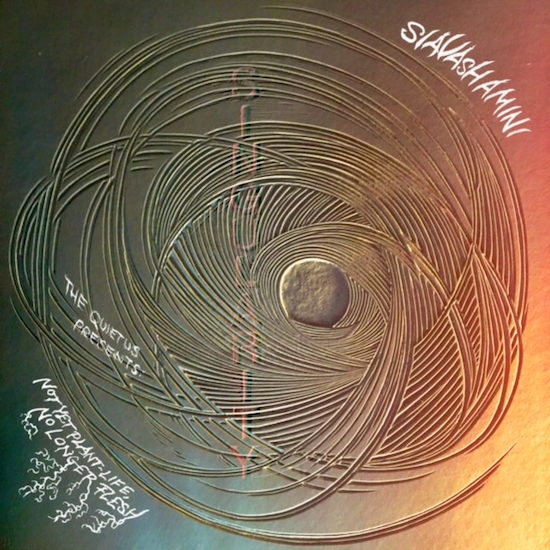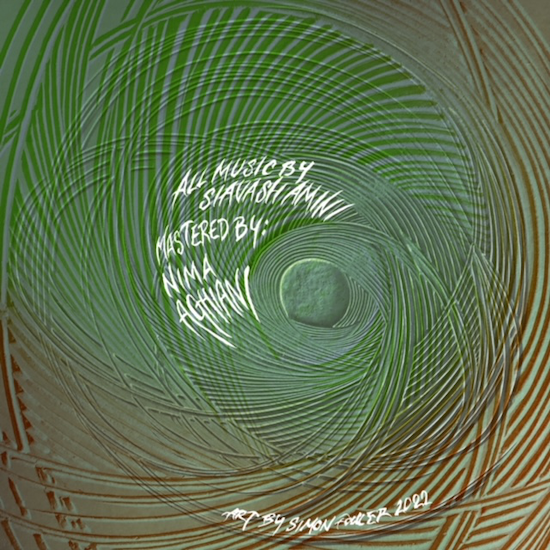Siavash Amini portrait By Ashkan Norouzkhani
To receive Singularity track ‘Not Yet Plant Life – No Longer Flesh’ by Siavash Amini become a Quietus Sound & Vision subscriber
Life in Iran has been particularly tough over the last couple of years, says the musician Siavash Amini. “The political situation is beyond fucked. Our president…” he says shaking his head over Zoom from his home in Tehran. (Amnesty International has called for an investigation into President Ebrahim Raisi for alleged crimes against humanity, murder, enforced disappearance and torture.) “Any sound of the tiniest discontent gets oppressed at that moment. It’s the worst time, politically, that I think I have ever experienced in my life.” It’s having a real effect on the livelihoods of experimental musicians. “There’s no work for the likes of me here.” The commercial commissions and theory work that he and his contemporaries once relied on has all but dried up. Amini is fortunate that his considerable reputation internationally gets him commissions from outside of Iran, “but a lot of people don’t have that.”
Nevertheless, he keeps as busy as he can. “From the start, me and my fellow experimental music enthusiasts, our goal was not to give in to the pressure, so we’ve become resilient to this kind of situation. Everything [the government] do, we find a new way to keep going,” he says. Recently, he finished a new double album with the poet and philosopher Eugene Thacker. They’d long been influencing each other from afar – Thacker was a key inspiration for Amini’s Tar/Foras/Serus trilogy released between 2017 and 2019 – and then “one day he just emailed me out of the blue.” Their new project Sad Poets is based on writing by Thacker, with Amini working on ways to communicate his poetry sonically but without using the human voice. On a planned third volume, they’ll invert the formula by using the human voice in a way that’s entirely unintelligible – “through multiple techniques, from granular synthesis to putting the singer in a bucket!”
It was also Thacker who led Amini to the inspiration for a special new tQ commission – part of our ‘Singularity’ series of one-off releases exclusively for our subscribers. Given a theme of ‘transformation’, the musician was drawn to Les Chants de Maldoror, the transgressive 19th century prose poem by the Comte de Lautréamont whose titular character is among the most grotesque and purely evil in literary history. A stream of consciousness constantly between different stylistic forms and narrative perspectives, its headspinning clashes of controversial themes were a key inspiration on the surrealists of the subsequent century. As Amini puts it, “It’s fucking crazy how it goes from this to that, you can’t make sense of it in the first read.”
In an essay, Thacker had written about how the book (as he puts it in the abstract) “complicates the boundary between animality and spirituality,” and picked up on one passage in particular that for Amini really stood out. In it, Maldoror undergoes a hideous transformation, his body parts becoming a thriving and violent ecosystem, his genitals taken over by vipers and hedgehogs. “I am filthy. Lice gnaw me. Swine, when they look at me, vomit. vomit. The scabs and sores of leprosy have scaled my skin, which is coated with yellowish pus. I know not river water nor the clouds’ dew,” he says.

In Thacker’s essay, he explores the way that the actual text of Maldoror goes through a metamorphosis of its own as the author describes this process. “He’s transforming into this dripping, oozing creature, and the way he describes it captures the same intensity,” as Amini surmises. When he had first read the book from start to finish five years ago, he had struggled to see past its surface level “perverted surrealism gone to the extreme,” but thanks to Thacker, and other academic analyses, he started to see it as “more than just the shock value. Eugene’s reading of it talks about the mystical experience in Maldoror, the anamorphosis of a person becoming a swarm of birds and then a dog. It’s similar to negative theology and mysticism.”
Amini’s ‘Singularity’ piece ‘Not Yet Plant Life – No Longer Flesh’, takes its title from a line in the Maldoror passage (as translated by Alexis Lykiard) that Thacker analysed: “My feet have taken root in the soil forming a sort of perennial vegetation – not yet quite plant-life though no longer flesh – as far as my belly, and filled with vile parasites.” It is a sprawling and intimidating piece, a mishmash of jarring textures that somehow swarm together into a teeming whole. For its structure, Amini took inspiration from an image in Maldoror of the character sprouting a host of limbs, each belonging to a different creature. From whirring and bubbling industrial electronics to high-pitched screeches to long and languorous notes, each ‘limb’ is expressed as a separate texture created with modular synth patches.
“There’s no way of actually mapping something from literary theory to a musical work, but you can map it imaginatively,” Amini explains. “So what I did was copy the way that some of the forms in Maldoror behave by becoming their extreme conclusion. They rip apart or float, or something gets sucked out of them. So I was pushing these patches in certain ways so that they’d rupture and recording long takes.” Then, he connected all these extreme takes to a central spine (described as being a “sword” in the original passage), building a Maldororian monster of his own in song. “I thought that because the whole thing is one creature, it should have consistency to it. If I’m treating them like limbs, how can I make them connect in a way that makes sense?”

Given the disparate nature of Amini’s modular takes, the threads that join them to one another are spider silk thin. To make these delicate intersections possible, he made use of the microtonality that he has been exploring in depth across his recent work, which in essence involves the eschewing of the rigid octave divisions of Western notation in favour of alternative and potentially more flexible systems. “Microtonality opens up some very interesting areas regarding pitches and intervals. Different expressions that I wouldn’t be able to achieve with regular systems. It’s made me transition from very melodic, monophonic textures to very complex textures in a short amount of time.”
All of this goes to say that Amini’s ‘Singularity’ track is an intense creative exercise, a piece on which he flexes all of his muscles as one of the world’s boldest experimental musicians. “I think it’s vital for people to live the way we do,” he says. “At least a small amount of people. To not conform to the rules that much. I protest in the street as a citizen, but as an artist I’m willing to take other risks. Growing up, what I saw was people getting more and more disappointed and giving up on the things they were doing, or conforming to something more grounded. But I think it’s important to show that you can have certain communities, and keep going with the experimental life. You might not know how it ends, but you know how you want it to be."
To receive ‘Not Yet Plant Life – No Longer Flesh’ by Siavash Amini, as well as a host of other benefits including exclusive essays, podcasts and playlists, and loads more specially-commissioned music, become a Quietus Sound & Vision subscriber. You can do so here



